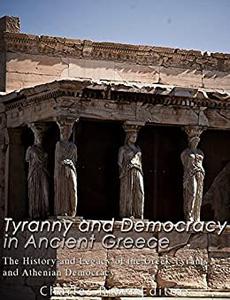
Tyranny and Democracy in Ancient Greece: The History and Legacy of the Greek Tyrants and Athenian Democracy by Charles River Editors
English | November 30, 2016 | ISBN: 1540702375 | 146 pages | EPUB | 1.14 Mb
*Includes pictures *Includes ancient Greek accounts of the tyrants and democracy in Athens *Includes a bibliography for further reading "States are as the men are; they grow out of human characters. Like State, like man." – Plato, The Republic Tyranny in ancient Greece was not a phenomenon limited to any particular period. Tyrants could be found in power throughout Greece, ruling poleis from the 7th century B.C. right through to the 2nd century B.C., when Roman domination effectively put an end to this form of government throughout the Hellenistic world. That said, the heyday of tyranny was undoubtedly the 7th and 6th centuries B.C., and it is in this period, known as the "Age of Tyrants," that large numbers of tyrannies arose, particularly in the Peloponnese. The "Age of Tyrants" ended on the Greek mainland with the expulsion of the Peisistratidai in 510 B.C., but it continued in other parts of the Greek world, particularly in the Greek cities of Sicily, where tyranny did not finally end until the removal of Dionysius II of Syracuse in 344 B.C. In Asia Minor, tyranny survived the Persian conquest until the days of the Roman conquest. The governments of the majority of the Greek states in the Archaic and Classical periods were in the hands of local aristocrats, and it is a modern preoccupation with the Athenian democracy or Sparta’s unique system that has tended to obscure this fact. Oligarchy was the norm, and political power derived from wealth and birth. As the wealth of city states grew, so, too, did the number of citizens who, despite personal wealth, found themselves outside the very limited aristocratic elite that conspired to maintain the political power of the few. In today’s modern world every political regime, even the most authoritarian or repressive, describes itself as democracy or a Democratic People’s Republic. The concept of rule by the people, on behalf of the people, has come to be accepted as the norm, and very few would overtly espouse the cause of dictatorship, absolute monarchy or oligarchy as the most desirable political system upon which to base the government of any country. It is also generally accepted that democracy, as a political ideology, began in Greece, specifically in Athens, in the 7th century B.C. and reached its zenith in the 5th century under the leadership of Pericles. Dating an exact starting point is impossible, but at the beginning of the 7th century B.C. Solon inaugurated a series of reforms that began the movement away from rule by individuals, or tyrants, and by the end of that century the reforms of Cleisthenes provided the basis of the Athenian democratic system that culminated in the radical institutions introduced by Ephialtes and Pericles in the 5th century. The result was the first, and possibly only, truly participative democratic state. Ironically, between 322 B.C. and the 19th century, Athenian democracy was almost totally forgotten. If there was any mention of democracy in Athens at all, it was in reference to so-called but largely mythical notions of Solonian democracy as recorded in Plutarch’s Life of Solon or Aristotle’s Politics. At the beginning of the 19th century, scholars such as August Boeckh began the evaluation and study of democratic Athenian institutions, and inscriptions and the writings of Thucydides and Demosthenes, among others, were used to re-construct those democratic bodies and to gain an understanding of their workings. Later in the century, academics, particularly George Grote, provided new insights into the Athenian democratic processes, and today there is a much fuller understanding of what contributed to Athenian political life. That said, the questions of how and why Athens came to develop the political system it did remain a major area of academic contention.
Buy Premium From My Links To Get Resumable Support,Max Speed & Support Me
Links are Interchangeable – No Password – Single Extraction










Leave a Reply
You must be logged in to post a comment.